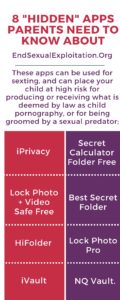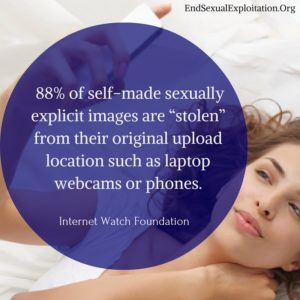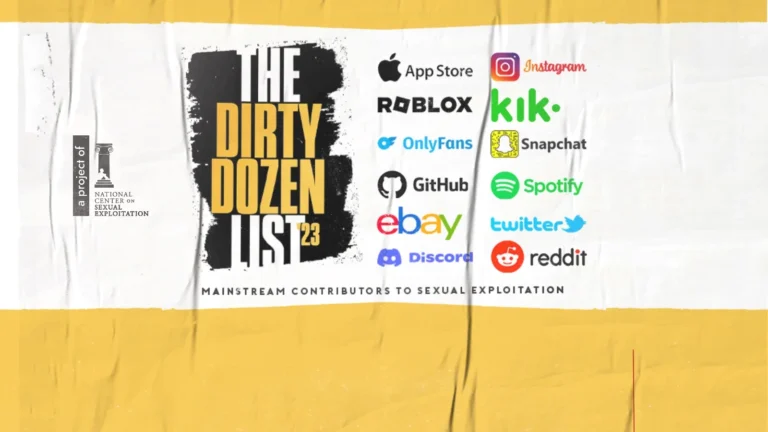By: Irene Neumann
The phenomenon of “sexting”—the practice of taking and sending sexually provocative or explicit photos of oneself and sending them to another person via email or mobile device—has taken youth culture by storm. According to a CBS News article that quotes Dr. Kristin Perry, a psychologist and founder of a parenting resource called Inparentis, “sexting is the new flirting.”
But let’s be clear: sexting among those under 18 is more correctly considered self-produced softcore or hardcore child pornography depending on what is depicted. Even though it is self-produced, it is important to recognize that tweens and teens are immature and that key psychosocial skills, such as the ability to weigh risks, are not fully developed. Additionally, they are frequently enticed, pressured, and even bullied by their peers to create and send sexts. In many other instances, they are groomed by older, predatory adults seeking sexually suggestive or pornographic images of, and even sexual encounters, with minors.
The so-called “sexting scandals” that have occurred in Cañon City, Colorado, Long Island, New York, as well as other states, reveal how today’s technologically savvy teens use “Hidden” (a.k.a. “Ghost”) and other apps in order to surreptitiously send sexually explicit images privately on their mobile devices. Among these apps are names like iVault, KeepSafe, Secret Calculator, Poof, Whisper, and KiK Messenger to name a few. Each of these has different features that hide sensitive photos or videos, and/or can be used to facilitate connections with unknown individuals. How harmful are these apps, and what can parents do to mitigate the dangers that they can pose?
Let’s first explore some of these apps in terms of their functions and features to see where harm can lie. The ability to self-destruct messages and images is an app feature that appeals to teens who wish to engage in sexting. For instance, BurnNote, as the name implies, is a messaging application service that claims to destroy users’ message data as does the popular Snapchat app.
Another feature found in many apps permits users to not authenticate their identity, thus allowing them to remain anonymous. An example is the dangerous Omegle. It functions as a video chatting app, which randomly pairs anonymous users who can chat either by video or by text. Users are able to connect to Facebook to find chat partners who purport to have similar “likes.” The service is also home to sexual predators. The app Whisper also does not require users to register. It is known as a “confessional” app that allows users to communicate with other users nearby through GPS. Megan Maas, a sex educator, whose summary of dangerous apps appears on the ForEveryMom website, tells of a Seattle man who was charged with raping a 12-year-old girl he met on the Whisper app.
allowing them to remain anonymous. An example is the dangerous Omegle. It functions as a video chatting app, which randomly pairs anonymous users who can chat either by video or by text. Users are able to connect to Facebook to find chat partners who purport to have similar “likes.” The service is also home to sexual predators. The app Whisper also does not require users to register. It is known as a “confessional” app that allows users to communicate with other users nearby through GPS. Megan Maas, a sex educator, whose summary of dangerous apps appears on the ForEveryMom website, tells of a Seattle man who was charged with raping a 12-year-old girl he met on the Whisper app.
Blendr, a non-authentication sexting or “flirting” app, allows a teen to meet users close to home through GPS. Apart from being a venue to send sexual images, videos, and messages, users of Blendr can rate the “hotness” of other participants’ images much the same as does the Hot or Not app. Unfortunately, sexual predators can use Blendr and similar apps to entice or coerce a minor to a meet-up locally.
The Tech Journal lists its own top apps to hide one’s private photos and files, which parents should review before monitoring their teens’ phones. These are:
- iPrivacy
- Lock Photo + Video Safe Free
- HiFolder
- iVault
- Secret Calculator Folder Free (an interface that looks like a calculator but requires a PIN)
- Best Secret Folder (password and pattern lock protected; sets off an alarm if accessed without permission)
- Lock Photo Pro: Private Album Manager & Organizer (sexy ‘pics’ can be kept in a separate stash)
- NQ Vault – Hide private pictures (hide photos, videos, and Facebook messages)
The Internet Watch Foundation (IWF) estimates that 88% of self-made sexually explicit images are “stolen” from their original upload location such as laptop webcams or phones. Two examples will illustrate this point. According to ForEveryMom, Snapchat, a popular sexting app, is not as safe as some believe; the photo “snaps” can be recovered—the receiver can take a screen shot and share them with others. Many Snapchat images have found their way on “revenge” porn sites. Sexual predators can also “steal” images by using messaging apps such as Kik to groom unsuspecting teens, and then they extort images to be shared as child pornography (i.e. child sexual abuse images).
What can parents do about dangerous hidden apps to address specifically if their teen is using them?
Parents need to identify the types of apps specific to their teen’s mobile device. Some are specific to iPhone while others to Android phones, as explained in an Uknowkids article. In addition, the Teensafe site describes a number of apps particular to each phone type. Hide it Pro, disguised as an “Audio Manager,” is an example of an app that is available for both Android and iPhone smartphones.
 Teensafe describes red-flag behaviors that parents might watch for when monitoring the digital media activities of their teens. Among these are a sudden increase in media usage, a browser history with missing chunks of texts, and the act of hiding phone screens in the presence of parents. Refusing to hand over passwords could also indicate a red flag.
Teensafe describes red-flag behaviors that parents might watch for when monitoring the digital media activities of their teens. Among these are a sudden increase in media usage, a browser history with missing chunks of texts, and the act of hiding phone screens in the presence of parents. Refusing to hand over passwords could also indicate a red flag.
Based on the discussion above, it becomes clear that dealing with the secretive and ubiquitous nature of hidden apps is a challenge. Parental controls on mobile devices and Internet usage is one way to address the problem. Thankfully, there are also apps that allow parents to monitor their kids’ smartphone activity, such as Kids Place and Abeona, but be aware that some messaging services like Kik Messenger, however, do not offer parental controls.
Parents need to be cautious in their monitoring efforts. A Mashable article describes Private Photo Vault’s (iPhone) capabilities and features. This vault app provides a “break-in report,” the GPS location of someone entering the app, as well as their photo. When monitoring is not enough, the way forward might be to engender in the young some digital media “street smarts.”
Ensuring that Internet filters are installed on home computers, video games, and smart phones is also essential. Internet filter providers such as Covenant Eyes can help shield your family from the dangers. Nevertheless, it is important to be vigilant in monitoring your child’s online activities, to maintain an open dialogue about their Internet presence, and what is happening among their friends and acquaintances, as much of what happens in schools and children’s social networks is beyond parental control.
The National Center on Sexual Exploitation (NCOSE) advocates that parents engage early on with their tweens and teens about the sexting issue. In a deeper conversation, parents could ask for instance: “What do you want your online persona to be?” or “What do sexts say about the people sending and requesting them?” The wisdom parents need to convey to their young is that their value as a human being is not in their sexuality.
In closing, parents can find valuable information on the topic of sexting. Porn Harms Research, which is affiliated with and linked to NCOSE, is a resource for studies on sexual exploitation. The research topics vary and include the emerging trend of youth-produced sexual content (IWF study). On the Uknowkids website parents will find notable sexting facts and statistics.
Works Cited:
Allen, Anaita. (2014). “Top 7 secret apps to hide your private photos and files.” Retrieved from http://thetechjournal.com/electronics/iphone/secret-apps-to-hide-your-private-photos.xhtml
CBS News. (2014.) “‘Sexting is the new flirting’ as teens turn to secretive apps.” Retrieved from http://www.cbsnews.com/news/sexting-modern-day-america-photo-vault-apps/.
Internet Watch Foundation. (2015). “Emerging patterns and trends report #1. Youth-produced sexual content.” Retrieved from http://pornharmsresearch.com/wp-content/uploads/Emerging-Patterns-and-Trends-Report-1-Youth-Produced-Sexual-Content-1.pdf
Maas, Megan. (n.d.) “Parents, if your kids have any of these 10 dangerous apps, it’s time to hit “delete.” Retrieved from http://www.foreverymom.com/parents-kids-10-dangerous-apps-time-hit-delete/.
Patchin, Justin W. (2013). Summary of state sexting laws. Cyberbullying Research Centre blog. Retrieved from http://cyberbullying.org/summary-of-state-sexting-laws/
Singh, Kyli. (2014). “7 Secret apps to hide your sexy photos.” Retrieved from http://mashable.com/2014/09/29/sexting-photo-apps/#jRJvGPNbdsqD
Uknowkids. (2014.) “Sexting facts and statistics: why parents should be concerned.” Retrieved from http://resources.uknowkids.com/blog/sexting-facts-and-statistics-why-parents-should-be-concerned
Williams, Amy. (2015). “Find hidden apps your teen doesn’t want you seeing.” Retrieved from http://www.teensafe.com/blog/find-hidden-apps-your-teen-doesnt-want-you-seeing/
Woda, Tim. (2014.) “Calculator or Hidden App? Teens are disguising content with Apps.” Retrieved from http://resources.uknowkids.com/blog/calculator-or-hidden-app-teens-are-disguising-content-with-apps



